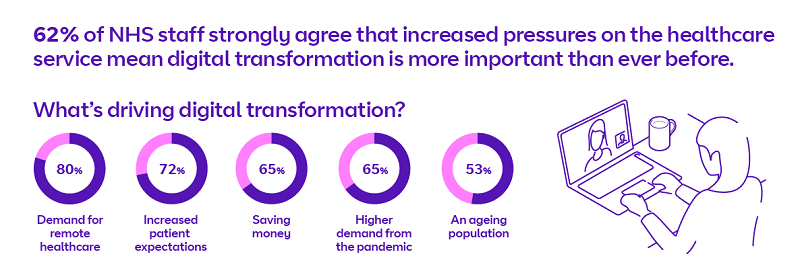The UK health sector is fast accelerating its digital transformation plans in response to the surge in demand for remote services during the COVID-19 pandemic.
This is the conclusion of a new study by iGov and BT which explores how health organisations across the UK are adopting new approaches to patient care as a result of the Coronavirus outbreak.
Despite the unprecedented pressures the NHS is facing, it’s fantastic to see the new level of optimism and ambition from NHS colleagues in fast-tracking digital innovation in the aftermath of the pandemic
The survey of 70 NHS organisations and clinical commissioning groups (CCGs) reveals that digital transformation sits high on the healthcare agenda, driven by demand in remote services (80%), rising patient expectations (71%), and pressures from the pandemic (65%).
And digital transformation of the sector is seen to be so critical in delivering better patient care that 86% of respondents plan to bring forward their timelines this year to embed better technology infrastructure and adoption.
But, despite the sector’s clear ambitions to digitise healthcare services, NHS staff still cite considerable barriers to technology adoption.
While cost is traditionally perceived as the biggest challenge in the public sector, the study indicates that concerns over cost (39%) are far outweighed by a cultural resistance to new digital processes (60%).
For instance, while 97% of UK adults have used technology this past year to connect with the NHS, only 18% of health organisations currently use patient health apps.
This is despite almost 70% acknowledging that smart apps contribute to better patient service.
Similarly, only 40% of NHS staff use an online booking system, undoubtedly causing delays and a reduced level of service during the national lockdown and associated social distancing measures.

When asked about the biggest barriers to delivering healthcare remotely, NHS staff cite a lack of digital skills and access for both healthcare colleagues and patients.
Though almost all (98%) of respondents have experienced a surge in patient demand for remote services, 71% say that a patient’s ability to use and access digital services without assistance remains an issue.
And more than half also say they don’t have the systems in place to access critical systems, such as patient records, in real time.
Even with some remote health services in place, 43% have reported difficulty connecting from remote locations successfully.
With almost five million people waiting for operations in England alone – the highest since 2007 – digital technologies and solutions must be deployed at pace to help the NHS to deliver flexible, personalised, and anticipatory care to patients
Professor Sultan Mahmud, director of healthcare in BT’s Enterprise Unit, said: “Despite the unprecedented pressures the NHS is facing, it’s fantastic to see the new level of optimism and ambition from NHS colleagues in fast-tracking digital innovation in the aftermath of the pandemic.
“But we know that there are considerable, resource, technological, and cultural challenges which still need to be addressed to reap the true benefits of digital innovation.
“With almost five million people waiting for operations in England alone – the highest since 2007 – digital technologies and solutions must be deployed at pace to help the NHS to deliver flexible, personalised, and anticipatory care to patients and release capacity wherever possible. And that’s where BT can help.
“The survey indicates that over 70% of NHS strongly agree that the strength and reliability of their network, wi-fi infrastructure and mobile technology will be essential to the next phase of their digital transformation strategies.
“As a critical enabler for the country, BT’s infrastructure, technology expertise and commitment to innovation can support healthcare organisations across the UK to transform levels of patient care for the better.”




